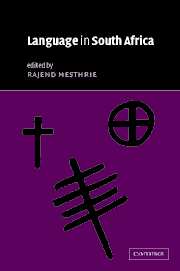Book contents
- Frontmatter
- Contents
- List of maps
- List of contributors
- Acknowledgements
- List of phonetic symbols
- List of abbreviations
- Introduction
- Part I The main language groupings
- Part II Language contact
- 9 Fanakalo: a pidgin in South Africa
- 10 Mutual lexical borrowings among some languages of southern Africa: Xhosa, Afrikaans and English
- 11 Code-switching, mixing and convergence in Cape Town
- 12 Code-switching in South African townships
- 13 Intercultural miscommunication in South Africa
- 14 Women's language of respect: isihlonipho sabafazi
- 15 The sociohistory of clicks in Southern Bantu
- 16 The political economy of language shift: language and gendered ethnicity in a Thonga community
- 17 From second language to first language: Indian South African English
- 18 Black South African English
- 19 The lexicon and sociolinguistic codes of the working-class Afrikaans-speaking Cape Peninsula coloured community
- 20 An Introduction to Flaaitaal (or Tsotsitaal)
- 21 Language and language practices in Soweto
- Part III Language planning, policy and education
- Index
- References
9 - Fanakalo: a pidgin in South Africa
from Part II - Language contact
Published online by Cambridge University Press: 22 September 2009
- Frontmatter
- Contents
- List of maps
- List of contributors
- Acknowledgements
- List of phonetic symbols
- List of abbreviations
- Introduction
- Part I The main language groupings
- Part II Language contact
- 9 Fanakalo: a pidgin in South Africa
- 10 Mutual lexical borrowings among some languages of southern Africa: Xhosa, Afrikaans and English
- 11 Code-switching, mixing and convergence in Cape Town
- 12 Code-switching in South African townships
- 13 Intercultural miscommunication in South Africa
- 14 Women's language of respect: isihlonipho sabafazi
- 15 The sociohistory of clicks in Southern Bantu
- 16 The political economy of language shift: language and gendered ethnicity in a Thonga community
- 17 From second language to first language: Indian South African English
- 18 Black South African English
- 19 The lexicon and sociolinguistic codes of the working-class Afrikaans-speaking Cape Peninsula coloured community
- 20 An Introduction to Flaaitaal (or Tsotsitaal)
- 21 Language and language practices in Soweto
- Part III Language planning, policy and education
- Index
- References
Summary
INTRODUCTION
Fanakalo (also spelled ‘Fanagalo’) is an intriguing South African pidgin language, for at least four reasons. First, its origins are uncertain, even though a number of explanations have been proposed to account for them. Second, from a structural point of view, the Fanakalo variety spoken on the mines in South Africa is atypical: for instance, it exhibits a number of features that pidgins do not typically possess. A third reason is the assumption by many that it is used only in the mining industry. Closer examination shows that it is an interactional resource which is employed for a range of purposes and in a range of settings. Finally, Fanakalo conveys at least two social meanings, one pejorative, the other positive in its associations. Because of its pejorative connotations Fanakalo is being replaced on certain gold mines because of what it connotes, yet it is relied on in other settings because it enables some people to express solidarity with one another and reinforce their interpersonal relationships. These features are sufficient reason to explore Fanakalo in some detail.
PIDGINS AND HOW THEY DIFFER
A pidgin arises as an interactional solution to communication between two or more groups of speakers who do not share a common language. It is more or less complex, depending on what stage in the ‘pidgin–creole cycle’ it represents (see Mühlhäusler 1986; Romaine 1988). Its complexity also depends on the contextual circumstances prevailing at the time of the pidgin's genesis, and subsequently.
- Type
- Chapter
- Information
- Language in South Africa , pp. 179 - 198Publisher: Cambridge University PressPrint publication year: 2002
References
- 6
- Cited by



